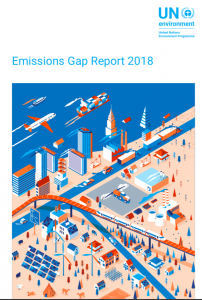IPCC: Summary for Policymakers Special Report 1.5
This report responds to the invitation for IPCC ‘… to provide a Special Report in 2018 on the impacts of global warming of 1.5°C above pre-industrial levels and related global greenhouse gas emission pathways’ contained in the Decision of the 21st Conference of Parties of the United Nations Framework Convention on Climate Change to adopt […]
UNEP: Emissions Gap Report 2018
This is the 9th edition of the UN Environment Emissions Gap Report. It assesses the latest scientific studies on current and estimated future greenhouse gas emissions and compares these with the emission levels permissible for the world to progress on a least-cost pathway to achieve the goals of the Paris Agreement. This difference between “where […]






